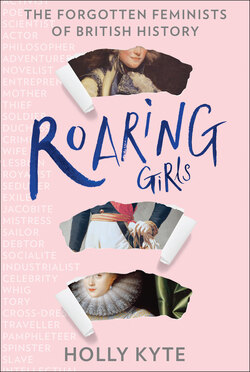Читать книгу Roaring Girls - Holly Kyte - Страница 11
IS THIS WHAT A FEMINIST LOOKS LIKE?
ОглавлениеThe urge to label such extraordinary women from history as ‘feminists’ is almost irresistible. Naturally, we want to ‘think back through our mothers’, as Virginia Woolf phrased it,[17] and find inspiring heroines to admire; it’s our way of trying to bridge the gap between us, so we can all be on the same team. But to foist modern values and paradigms onto women who lived hundreds of years ago is to set ourselves a trap. If we take the dictionary definition of a feminist as one who supports ‘the advocacy of women’s rights on the ground of the equality of the sexes’,[18] the majority of the women in this book don’t qualify. Most would never have spared a thought for whether women should be granted equal rights with men – that was too big a question too soon, given the scale of the obstacles; they were usually far too busy trying to negotiate their own lives to worry about anyone else’s. The human rights that women enjoy today would have been met with stunned disbelief by these women, and the word ‘feminist’ with a blank stare.[19] The women’s suffrage movement was only just beginning to coalesce in the 1850s, so any woman who spoke out in defence of her sex before then was not a spoke in the wheel of any political or civil movement, buoyed by support from like-minded allies; she was a lone voice in a din of misogyny.
When examining the lives of historical women, there’s no ignoring that their world was not our world; they lived by a different set of standards, a lower bar of expectation, and to try to force our modern concept of feminism to fit retrospectively would be foolhardy. As such, our Roaring Girls don’t always behave in the ways we might want them to or say the things we want to hear. Many of them are a mass of contradictions. With their natural instincts so out of kilter with the social conventions of their day, the result was often paradoxical characters who were both products of their time and ahead of their time. To avoid disappointment, they should always be viewed against their own historical backdrop, rather than ours.
Which is why it can only ever be anachronistic to label these women simply as feminists. And yet, the spirit of feminism was not born with the word. There was no Damascene moment when the movement burst into being, fully formed and fully armed, like Athena sprouting from the head of Zeus. It didn’t arrive with the first Suffragists in the 1860s; it didn’t even arrive with Mary Wollstonecraft in the 1790s. Its birth was slow, incremental, painful and faltering, forged over centuries and across the world, by actions great and incidental, by people famous and forgotten.
What binds these women together, then, is not that they were feminists as we would understand them today, but that they all in some way broke the heavily gendered rules of what a woman ‘ought’ to be and began the work of rewriting them, exposing ignorance, reclaiming their freedoms and overturning preconceptions as they went. They may not have realised it, but that in itself was a feminist act. If we can allow ourselves to relax the remit of the word, we might call these formidable women a fraction of the many early feminists, proto-feminists, accidental, unwitting, even reluctant feminists, who, despite every effort to suppress them, dared to be extraordinary – who, between them, struck the first sparks of what would later become a blaze.
This book is intended as a celebration of these unconventional women’s lives, in all their messy, three-dimensional wonder, in the hope of affording them a little of the gratitude and recognition they so richly deserve, and reclaiming some of the complexity that has historically been denied them. It’s time we viewed such women not as saints or martyrs, heroes or villains, virgins or whores, masculine or feminine, but as real, contradictory, compelling human beings who laughed, loved, cried and fought their way through life, making the best of it, making mistakes – and each in their own way making history. Above all, it’s a collection of stories about courage – the courage of women who, in a world that constantly told them no, stood firm and roared back the word yes.
